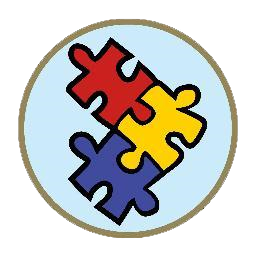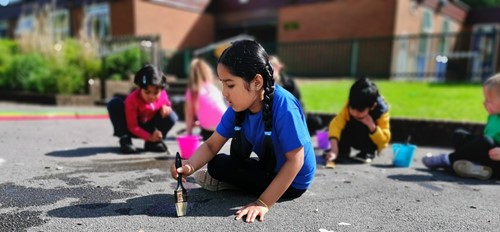
Early Years at Hollinswood
Welcome to our Early Years Foundation Stage (EYFS). Here you will find all the essential information about our curriculum and the resources we use to support our teaching and learning.
Intent
At Hollinswood Primary School and nursery, we adhere to the four fundamental principles that shape our practice within Early Years. We value every child as an individual and strive to provide an inclusive and nurturing environment where they can thrive. We acknowledge the importance of strong partnerships with parents and carers, understanding that their involvement plays a vital role in their child's education. Our curriculum ensures children learn and develop key knowledge and skills that can be carried forward into Year 1 and beyond.
The four fundamental principles - from the Statutory Framework for the Early Years Foundation Stage are:
- Every pupils is a unique child, who is consistently learning and can be resilient, capable, confident and self - assured.
- Pupils learn to be strong and independent through positive relationships.
- Pupils lean and develop well in enabling environments with teaching and support from adults, who respond to their individual interests and needs and help them to build their learning over time. Pupils benefit from a strong partnership between practitioners and parents and/ or carers.
- Pupils learn and develop at different rates so the curriculum offered caters for each child's individual needs.
We believe that all children, including those with Special Educational Needs and Disabilities (SEND) and those from disadvantaged backgrounds (PPG), should have the same opportunities. We encourage all children to be curious, to play and explore, and to actively engage in their learning. We aim to develop their skills of creativity and critical thinking throughout their time in the Early Years.
Our dedicated and highly skilled team of teachers and support staff work collaboratively to create a learning environment that promotes curiosity, independence, and a love for learning. We believe in hands-on, practical experiences and provide a wide range of stimulating activities and resources to engage children's interests and cater to their different learning styles and needs.
We place a strong emphasis on the development of communication and language skills, as these are the foundation for all other areas of learning. We provide a language-rich environment where children are encouraged to express themselves confidently and listen attentively to others.
In addition, we recognize the significance of fostering positive social and emotional development. We support children in developing empathy, resilience, and an understanding of their own emotions, as well as those of others. We promote a culture of kindness and respect, ensuring that our EYFS is a safe and welcoming place for all.
Through a well-balanced and holistic curriculum, we aim to provide pupils with exciting and meaningful learning experiences that inspire and motivate them. We foster a love for reading and books, encouraging children to explore different genres and develop a lifelong passion for literature. We also value the importance of outdoor learning and provide regular opportunities for children to explore and discover the natural world, including Forest School sessions at different points throughout the year.
We continuously reflect on our practice, seeking ways to improve and enhance the learning opportunities for our children. Our commitment to ongoing professional development ensures that our staff stays up-to-date with the latest research and best practices in early years education.
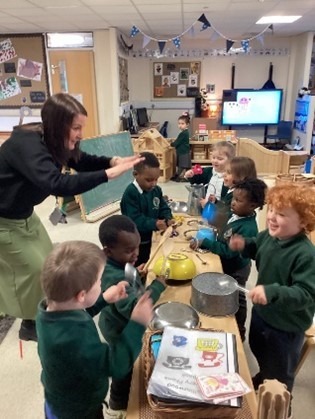
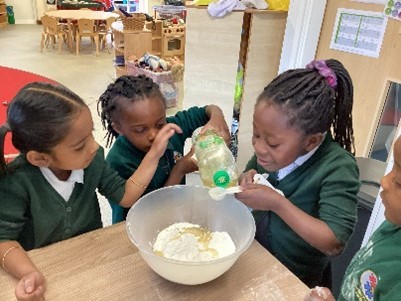
Curriculum
The core of our EYFS curriculum is the Statutory Framework for the Early Years Foundation Stage, which sets out the key principles and areas of learning that children should experience during their time in our EYFS.
Supporting the Statutory Framework, we also use Bug Club, a phonics program designed to develop early reading and writing skills. This program introduces children to letter sounds, teaches blending and segmenting, and provides opportunities for reading and writing across a range of texts. With Bug Club children develop a solid foundation in literacy that will support their learning throughout their educational journey.
To track and monitor children's progress, we use the Early Years Foundation Stage Profile, which provides a holistic assessment of children's development across the prime and specific areas of learning. This helps us to identify strengths and areas for development, ensuring that our teaching is targeted and responsive to each child's needs. We also reference Development Matters, Birth to 5 Matters, and the Seven Features of Effective Practice to inform our planning and provision. These documents provide guidance on age-appropriate milestones, learning experiences, and effective pedagogical approaches that support children's holistic development.
Nursery and Reception follow a year-long curriculum map that is linked to the rest of the school. This curriculum map outlines the seven key areas and ensures that each area is given sufficient time and coverage through well-planned themes. By following this curriculum, all children are able to learn and know more.
Our curriculum overview carefully planned to provide breadth and depth in learning. We introduce core concepts, bodies of knowledge, and key concepts that will be built upon in Year 1. Our ambitious curriculum is designed to sequentially develop the foundational knowledge necessary for reading, writing, and mathematics. Vocabulary is explicitly taught through teacher-directed and teacher-led learning, which children then use during their child-led play. This approach allows our pupils to acquire and remember more information, preparing them for future learning. We have identified end points across all seven areas of learning, as outlined in the EYFS progression document.
Daily reading is a central part of our curriculum, fostering a love of reading in our children. We regularly reread books to deepen familiarity with the content and enhance emotional engagement, ensuring that children remember and understand key concepts as they progress through school. We also focus on enabling children to learn about the lives and experiences of people whose perspectives differ from their own.
This document provides a breakdown of what we use to plan our EYFS curriculum: Planning sequence
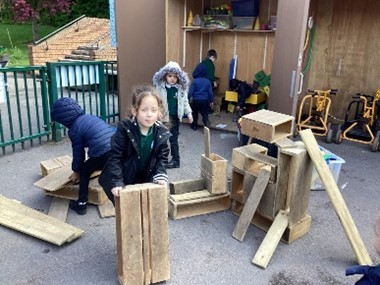
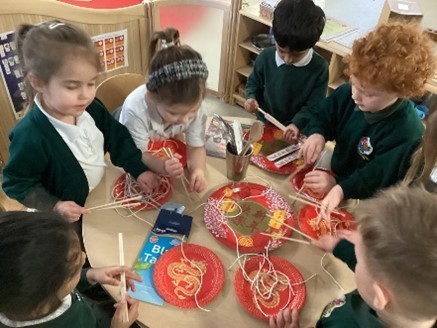
Enabling environments
We aim to provide a rich and engaging learning environment for our children in Nursery and Reception. Our curriculum is designed to promote play-based and experiential learning, combined with teacher directed and teacher led teaching, to ensure that our pupils make progress before moving onto Year 1.
Our pedagogical approach
We adopt a variety of teaching approaches to meet the diverse needs of our students. These include:
Teacher Directed
In our teacher directed sessions, our experienced staff directly teach new knowledge to the whole class or small groups. This involves carefully following our overview to efficiently cover the required content.
For example, during a teacher directed session, we may introduce a new concept or phonics sound to the entire class, or work with a small group to reinforce and apply knowledge of from prior learning.
Teacher Led
In our teacher led sessions, teachers work closely with children to reinforce and apply the knowledge they have gained. These sessions occur in small groups or on a one-to-one basis, allowing us to tailor our approach to the specific needs of each child.
For instance, during a teacher led activity, a teacher may guide a small group of children in using phonics skills to read and write simple words, or help a child develop problem-solving strategies during a mathematical task.
Child initiated
We also strongly believe in the power of child-initiated learning. Through play-based learning, children are given responsibility and autonomy in their learning. This approach allows them to take the lead, make mistakes, and form their own decisions in a safe and supportive environment.
During child-led activities, children have the opportunity to explore and apply the skills and knowledge they have acquired. They can engage in imaginative play, problem-solving challenges, and creative projects, all while developing their independence and critical thinking abilities.
Please click link below for a document which shows how continuous provision progresses from when the children start school and when they leave the EYFS:
Progression in Continuous Provision Overview.
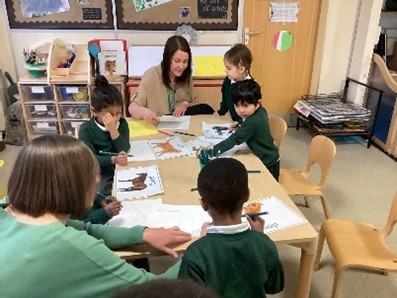
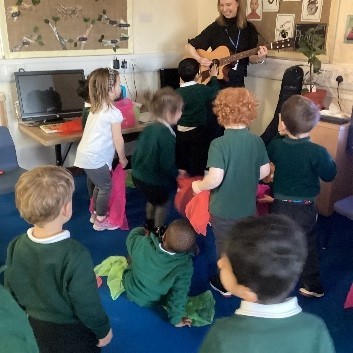
Our Learning Environment
Both our Nursery and Reception classrooms provide a range of indoor and outdoor learning opportunities. Our classrooms are designed to engage, inspire, and encourage our children to explore the world around them.
We provide a balance of planned, focused activities and child-led explorations. Our structured, well-established routines are carefully timetabled to ensure that children experience a variety of stimulating activities throughout the day. Staff plan enhancements to the continuous provision, ensuring there is challenge and progression in the children’s play behaviors and the resources they use.
Assessment
Assessment is an integral part of our daily practice, enabling us to identify gaps in knowledge and assess the effectiveness of our teaching strategies and provision. Staff meet weekly to reflect on the week and identify areas that need developing or discuss any observations made of the children. We provide regular feedback to our pupils, through positive interactions, helping them understand their strengths and areas for development and empowering them to take ownership of their learning.
We have termly moderation meetings where staff discuss the progress of the children and ensure there is a consistent approach and benchmark to our ongoing assessment. Any feedback is then actioned.
End of year summative assessments are finalised during the summer term, summarising each pupil’s development at that point against the Early Learning Goals. This assessment is then shared with the Year 1 team to ensure a smooth transition is achieved.
Attainment and Progress
Our curriculum, combined with high-quality teaching, leads to excellent attainment and progress for all our learners. Pupil outcomes are inline with local and national expectations, with 63% of children reaching the Good Level of Development in June 2023.
Hollinswood Early Years is driven by a clear intent, effectively implemented through high-quality teaching and learning. This generates a significant impact on pupils' academic achievement, personal development, and readiness for their future learning. Children move into Year 1 equipped with the transferable skills and qualities that will enable them to flourish in their future education and beyond.
Children will be:
- Respectful and have positive relationships with staff and peers. Manage their own feelings and behaviour, understanding how these have an impact on others and have a clear sense of right from wrong.
- Resourceful and show high levels of curiosity, concentration, and enjoyment of learning ready for the next stage of their education. Children will have developed their vocabulary and use it to make there learning and exploring come alive. They will have gained knowledge in key concepts ensuring the foundations for future learning are laid.
- Resilient and demonstrate their positive attitudes to learning through high levels of curiosity, concentration, and enjoyment. They will be resilient to setbacks and take pride in their achievements.
- Responsible and understand the importance of positive relationships in school. They will understand the importance for being accountable for their actions. Children will take care of the environment and understand the importance of good health, including oral health. They will always strive to be the best they can be.
